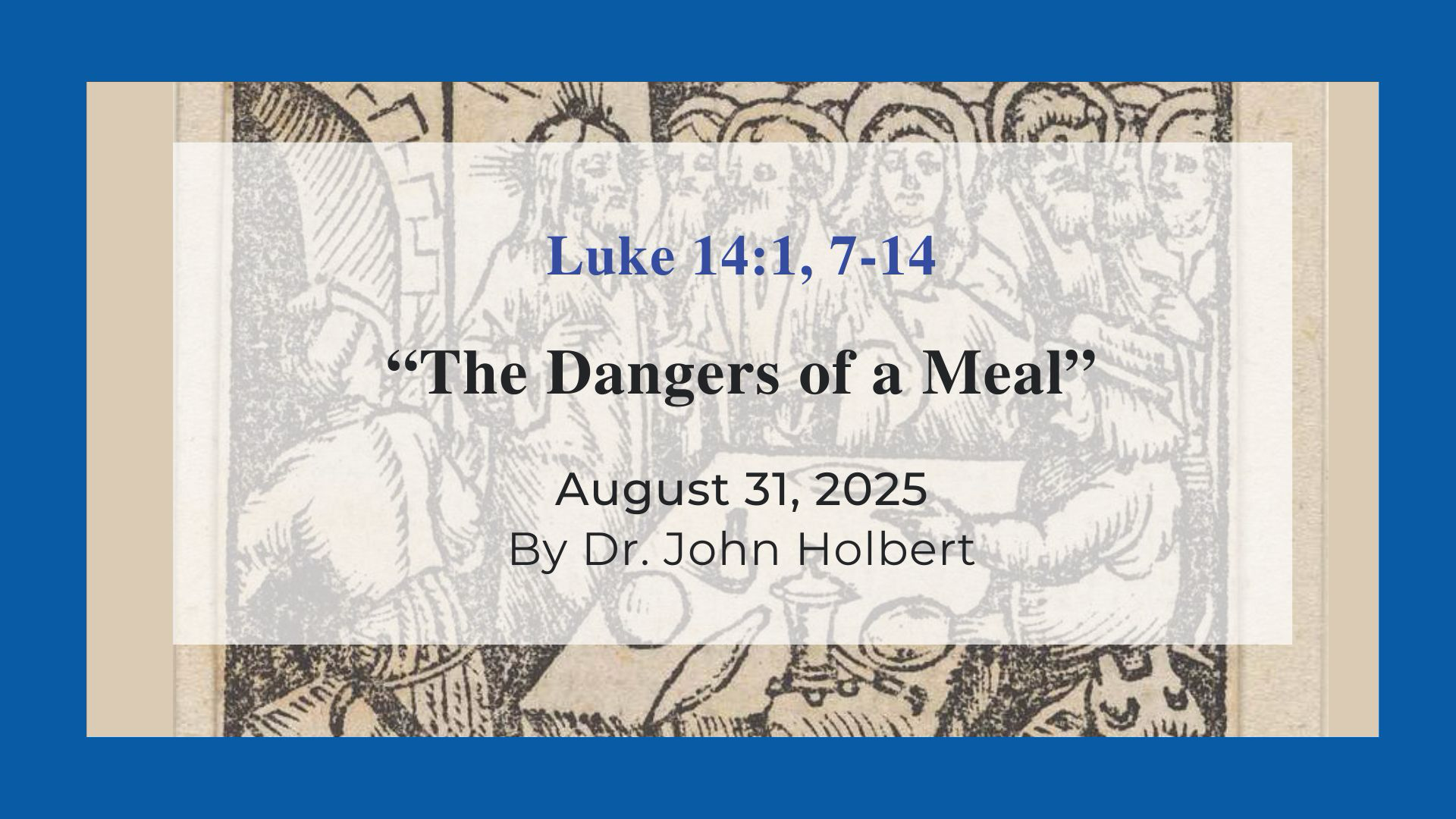The Dangers of a Meal - Reflections on Luke 14:1, 7-14, Pentecost 12, Year C
by John C. Holbert on Sunday, June 8, 2025

There is a very long history of the importance of eating a meal in the ancient world, and of one’s choice of eating companions. In a world where famine was always lurking, and where food at the best of times was scarce, eating a meal was a significant event, and to be asked to eat with others was a notable occasion. Meal preparation was long and arduous, requiring huge amounts of time for cleaning, chopping, boiling, baking, and setting the table just so. To be invited to a meal was not a casual thing, but a real event. So when Jesus is invited to dine with “one of the rulers of the Pharisees,” and on the Sabbath to boot, our suspicions about the invitation rise to a peak. Luke also warns us that “they had him (Jesus) under close scrutiny” (Luke 14:1). Reasons for Jesus’ later trial and death are many, but it could well be said that his regular eating with the wrong people was a large contributing factor.
In any case, Jesus accepts the invitation, but before the meal, or perhaps even during it, he is confronted with a man with dropsy. That English description of this particular condition is straight from the Greek word hydropikos, indicating swelling due to excess fluid buildup; we name it today edema. Jesus quickly turns the man’s medical issue into a question for the “lawyers and Pharisees” present at the meal. “Is it allowed to heal on the Sabbath or not?” (Luke 14:3). The answer is plainly “no,” though there could be exceptions according to rabbinic tradition. But in this case of edema, the condition could well be handled on any day, since it was not a critical one. Surprisingly, the Jewish leaders and experts in Torah say nothing to Jesus at all. Silence could well imply assent, but could also mean that the answer is so obvious as to need no comment at all. Jesus pushes the issue by referring to the common Jewish response to certain exceptions to Sabbath work: “If a child or an ox of any one of you falls into a pit on the Sabbath, won’t you quickly pull it out?” (Luke 14:5). The use of “child” here has long seemed peculiar, when connected to “ox”, so some manuscripts have “ass” instead of “child”. (The NRSV reads “child” but refers in a footnote to the appearance of “ass” in other manuscripts.)
In the face of that evidence about Sabbath work alluded to by Jesus, again a surprising silence ensues: “They were not able to reply to these things” (Luke 14:6). So now Jesus turns to his favorite teaching form, the parable. He had noticed, says Luke, that when the guests arrived they invariably chose the best places at table. So Jesus sets about doing what he nearly always does; he inverts expectations. Employing the common idea of honor and shame in Roman culture, surely consistent with any number of other older cultures in the Near East, he suggests to them that they be more careful about their choice of seating when invited to a “wedding feast.” If they choose the best place at table, they may face humiliation if “someone more honorable than you” has been invited, and when they arrive, the host of the feast may come to you and tell you to get out of the best seat and go down to the lower end of the table. How much shame you will feel! Instead, Jesus says, “go recline at the last place,” and then when the host sees you there, he may say, “My friend! Come up to a higher place!” Think of the honor you will experience when all the guests see you move up higher. (Luke 14:7-10)
So far, Jesus has said nothing especially out of the ordinary. After all, Proverbs 25:6-7 gives nearly the same advice: better to be told “come up here,” than to be sent to a lower place in the presence of royalty. All at table would find such advise wise, and may even act on its wisdom. But Jesus’ next words turn the entire episode in a decidedly uncomfortable direction. “For everyone exalting self will be humbled; everyone humbling self will be exalted” (Luke 14:11). No longer are we in the realm of honor/shame codes, but instead Jesus addresses the problem of anyone seeking exaltation over others. That must be avoided, he says, in order that God may be the source of of humbling and exaltation, not humans, hence the passive verbs of the phrase, suggesting God’s action. Gaining respect in the eyes of the guests is not the way to act at table.
Jesus continues to make even plainer his challenge to common modes of reciprocity in Roman society. Anyone can invite “friends, brothers, family, or rich neighbors” to lunch or dinner, because one may expect, or even deserve, a return invitation. Why not instead invite “the poor, the handicapped, the lame, the blind.” Then “you will be happy (blessed) that they are not able to repay you, but you will be repaid in the resurrection of the righteous” (Luke 14:12-14). This is kingdom talk; this is how society will work when God rules in life. This is the gospel of Jesus Messiah. Rewards come from God alone, and God’s rewards hardly ever resemble the rewards give and expected by the world. The meal at the Pharisee’s house has become a stage for the preaching of the gospel, a gospel that seeks to turn the world upside-down.
